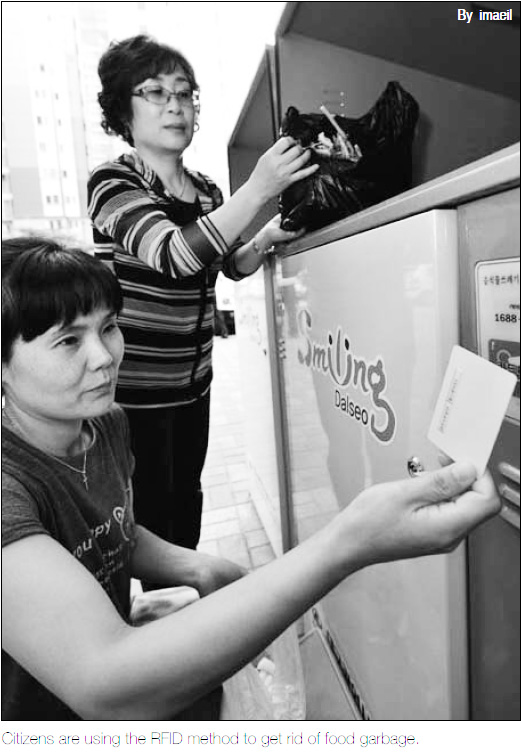
The Waste Control Act was tested from one year starting on June 1st 2012. The system of imposing a charge regardless of how much food garbage was wasted, which is a flat sum system, was changed to the new system to impose a charge in proportion to how much food garbage was wasted, a meter-rate system, since June 2nd 2013.
New methods of dumping food garbage have also been implemented with the new waste disposal system. The new methods are a radio frequency identification( RFID), wastebaskets and pre-paid authorized plastic bags. The RFID method is where residents put their food garbage in a plastic wastebasket with an RFID tag. The RFID tag can read the resident’s name and address, which is stored in his or her RFID cards, and measure the weight of food garbage. RFID will impose charges every month in this way. The RFID method is easy to impose an accumulative charge because of exact statistics management according to the amount of food garbage.
The wastebasket method is similar to the standard food garbage disposal system where residents put food garbage into a designated wastebasket with a sticker. In the case of apartment complexes, apartment management offices sell those stickers. The wastebasket will be brought by collectors after checking whether the sticker is attached or not. The pre-paid authorized plastic bag method is where people put food garbage into a plastic bag which is already paid for, but the bags are sold at grocery stores and are priced differently according to district. Also, plastic bags have a problem of the smell from food garbage, so the Ministry of Environment plans to discontinue the bag in 2015 to minimize citizen’s complaints.
The Ministry of Environment expects that the new system will reduce the amount of annual food waste by up to 20 percent, reduce expenses for disposing of food garbage and save energy. Moreover, there are reports of reducing food garbage after implementing the new system. The amount of food garbage was reduced by 48% in Wonju, 23% in Seogwipo, 12.6% in Cheongju and 12% in Seoul in July from the same period a year earlier.
However, some citizens think there is no big difference after implementing the system. You Ok-in(54, Cheongju) said, “Although the new disposal system was implemented, there is no change in my restaurant. It hasn’t changed the amount of food garbage left by customers or preparation for cooking food. Basically, I want to reduce the amount of food garbage to save money, but it’s not easy because there is a basic amount of food garbage.” Kang Mi-suk(50, Incheon) said, “The amount of dumped food garbage was reduced a lot since the new disposal system. When I cooked, I didn’t think about the amount. However, I now calculate the amount of food for my family after implementing the new disposal system.”
Kim Li-gwang(Officer of Waste Resources Management) said, “The purposes of the new disposal system is to make people feel a financial burden through the amount of food garbage which was made by themselves and to make people reduce the amount of food garbage. When we started the new disposal system, there were a lot of complaints from citizens because of the different methods of each district. However, now the new disposal system is settling well, and a lot of good reports are coming in about how to reduce the amount of food garbage. Additionally, some problems still remain such as mixing food garbage and normal trash, dumping without paying and food garbage being dumped into sewers after blending it. However, those are very hard to crack down on. They are the problems of our conscience, so we plan to advertise to curb those bad behaviors through community organizations or housewives’ groups.”
The Ministry of Environment forms a consultative group with municipal and provincial governments to prevent confusion and minimize people’s complaints. The trial state of the implementation of the new disposal system is that 129 out of 144 local governments have implemented it and other local governments, which haven’t implemented it yet, will implement it by the second half of this year.
By Kang Ill-gu l ig33@cbnu.ac.kr


 All
All Society & Global
Society & Global






 Kang Ill-gu
Kang Ill-gu











